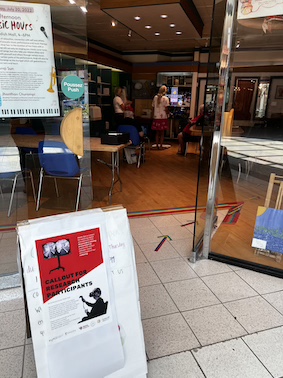 In 2019, Concordia Researchers were awarded an FRQS-grant for the project: Meet me at the Mall. On January 2020, the EngAge Living Lab (ELL) opened its doors in a small storefront in The Cavendish Mall (See CTV’s coverage). The aim of this project was to increase encounters, and facilitate interactions between researchers and community dwelling older adults on various topics ranging from leisure, to urban planning, to cognitive training and art-making or technology development. An important aim of the project was to provide an opportunity for our students to learn about the needs of older adults outside usual research centres, in order to envision creative and innovative modes of care for the psychosocial well-being of the ageing populations.
In 2019, Concordia Researchers were awarded an FRQS-grant for the project: Meet me at the Mall. On January 2020, the EngAge Living Lab (ELL) opened its doors in a small storefront in The Cavendish Mall (See CTV’s coverage). The aim of this project was to increase encounters, and facilitate interactions between researchers and community dwelling older adults on various topics ranging from leisure, to urban planning, to cognitive training and art-making or technology development. An important aim of the project was to provide an opportunity for our students to learn about the needs of older adults outside usual research centres, in order to envision creative and innovative modes of care for the psychosocial well-being of the ageing populations.
ELL was anchored by an Art Hive (led by Dr Janis Timm-Bottos and supplied with ample supplies to invite participants in exploring their creativity) and the Media Spa (led by Dr Najmeh Khalili-Mahani and supplied with various equipment for playing digitally with VR, Game consoles, iPads, Wacom tablets, etc.)
The Media Spa aimed to investigate the contextual affordances of Information and Communication Technologies (ICTs) for addressing physical and mental health needs of older adults. Several undergraduate students were given the responsibility to conduct research on how playing digital games can be beneficial to older adults. Specifically, we wanted to answer the question we had asked before, “for whom the games toll“, in order to compare the demographic and psychosocial characteristics of those who showed interest in such technologies outside a traditional research lab.
In this blogpost, Julian Leclair reflects on what made his experience in conducting research in a Living Lab successful.
Forget About Age.
Generally, people do not like being treated in a way that infers their age is significant. Age does not constitute an individual’s character or personality. We tend to change our demeanour depending on the age group we interact with; in many cases, this is appropriate, but in some cases, it can come off as patronizing. For example, superfluously expressing concern for older adults’ ability to care for themselves can be interpreted as infantilizing or degrading. Sometimes, we may even unintentionally perpetuate ageist stereotypes, which can become internalized in older adults. On numerous occasions, potential new members hesitated to participate in the Media Spa because they believed it was “beyond their time” to learn how to use gaming consoles. In contrast, most of our participants learnt how to use gaming technologies reasonably quickly, even those with limited or no experience. The only exception to this was Virtual Reality games, which are more complex and physically involved, and can sometimes cause dizziness or motion sickness.
Active Listening and Empathy Matter.
In my experience, active listening proved to be a valuable tool for building relationships with older adults at the Media Spa. This skill is more difficult to accomplish than it sounds. In short, active listening is a therapy technique developed by Carl Rogers that emphasizes giving full attention to another person uninterruptedly, paraphrasing and reflecting on what they’ve said, and engaging in the conversation without projecting judgements or dictating. Although this technique is used in psychotherapy, the principles of active listening can help anyone build relationships successfully. Sometimes unintentionally, we can prioritize expressing our opinions/thoughts without giving the other person a chance to be heard entirely, which can be a barrier to forming cohesive relationships. Finally, every age group faces unique challenges, and showing empathy goes a long way.
Be Genuine and Interested.
To succeed in such work, it is essential to have a genuine desire to work with older adults. Being personable, friendly, and open to learning from each other are also crucial to creating positive social interactions with participants. I noticed that many older adults would pass in front of the ELL, gaze at the beautifully displayed works of art, and examine the space, showing interest but hesitating to walk in and talk to members. In response, being proactive and approaching potential members with a friendly and gentle demeanour occasioned an opportunity to “break the ice” and get to know each other. One of the most valuable strategies to capture older adults’ interest in the Media Spa was to inquire which games they liked playing in a non-digital format so that we could present them with a familiar electronic game, reducing their discomfort/apprehension.
Create a safe and comfortable space for participants
We set a few rules for how to conduct our work in the Media Spa:
- Meet new or existing members with open arms and ensured they felt welcomed, and comfortable, both physically and psychologically.
- Reciprocally between researchers and participants, intimidatory/discriminatory remarks should never be made or tolerated.
- In keeping with the ethics of conducting research, participants must not feel pressured to participate. This can be achieved by repeatedly reminding subjects that their participation in digital playing is entirely optional and independent of their desire in engaging other activities in ELL (e.g., socializing, artmaking, enjoying a coffee/tea).
- When participants engage in potentially hazardous tasks, such as playing games in virtual reality (carries a risk of falls due to overexertion, discoordination), monitoring subjects and ensuring their safety is paramount.
- Participants with health issues, such as Dementia or Alzheimer’s, should always be accompanied by their caregiver and not left alone at the lab.
What Did I Learn and Enjoy?
I always looked forward to our shift on Fridays. Adrian and I would arrive in the morning, set up the games, and organize the space for the day. Typically, we would have Media Spa and engAGE Living Lab regulars show up throughout the day to play games or create art, especially to talk with us. We shared many special moments with participants, where we watched them take their first steps in VR and form friendships through multiplayer gaming. On several occasions, participants introduced us to their favourite game and taught us how to play, which led to a tradition of playing it whenever they visited, providing a foundation for our friendship to grow. I also enjoyed my many meaningful conversations with people passing by the living lab. It was clear that the Media Spa was fostering intergenerational socialization and creating an almost family-like environment, and it was touching to see how much happiness this brought everyone. Many participants, who maybe would have stayed home that day, were motivated to leave their houses to come to see us, play, and socialize.
I believe digital games offer a relaxing leisure time for many, and multiplayer games can promote social connectivity. Indeed, at the Media Spa, digital game playing was a social activity and provided a medium for people to come together. However, not games themselves, but the opportunity that they created to connect across generations was the most significant finding of our work. I’ll never forget a particular conversation in which a participant who said : “I didn’t think it was possible to still connect with youth, but I see now it is.” This was just one of several similar moments, and it made me realize the depth of society’s lack of intergenerational connection. Our society is more connected than ever through technology and social media, yet social isolation is exceedingly prevalent.
I hope our success in the ELL will inspire the implementation of similar projects across Montreal and other places worldwide. If we care about fighting social isolation, we should have community spaces, such as ELL, to bring people together without any incentive for medical or financial gain. Facilitating a community space dedicated to connecting people of all ages through art, music, and games was a profoundly gratifying experience.

Julian Leclair is a third-year undergraduate student completing a Specialization in Psychology BA at Concordia University. He believes technology holds many potential therapeutic applications for creative expression, cognition, and mental health. Julian is a research assistant for the Media Spa, a Media Health Lab project at the engAGE Living Lab, investigating digital playing with older adults. Currently, he volunteers at a non-profit centre that offers active listening and intervention. Julian wants to pursue graduate studies in counselling to become a licensed psychotherapist.
